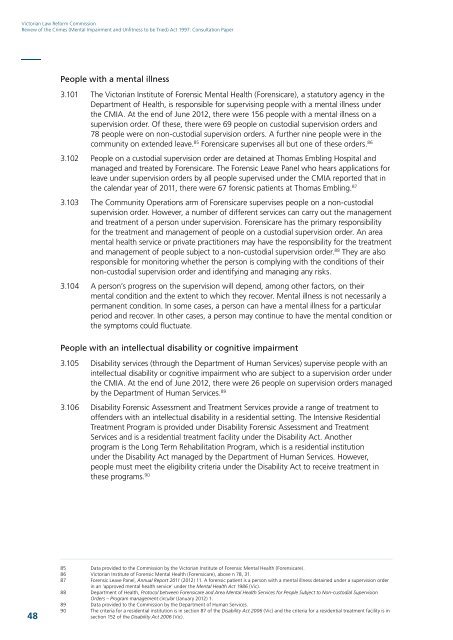Crimes Mental Impairment consultation paper.pdf - Victorian Law ...
Crimes Mental Impairment consultation paper.pdf - Victorian Law ...
Crimes Mental Impairment consultation paper.pdf - Victorian Law ...
You also want an ePaper? Increase the reach of your titles
YUMPU automatically turns print PDFs into web optimized ePapers that Google loves.
<strong>Victorian</strong> <strong>Law</strong> Reform Commission<br />
Review of the <strong>Crimes</strong> (<strong>Mental</strong> <strong>Impairment</strong> and Unfitness to be Tried) Act 1997: Consultation Paper<br />
People with a mental illness<br />
3.101 The <strong>Victorian</strong> Institute of Forensic <strong>Mental</strong> Health (Forensicare), a statutory agency in the<br />
Department of Health, is responsible for supervising people with a mental illness under<br />
the CMIA. At the end of June 2012, there were 156 people with a mental illness on a<br />
supervision order. Of these, there were 69 people on custodial supervision orders and<br />
78 people were on non-custodial supervision orders. A further nine people were in the<br />
community on extended leave. 85 Forensicare supervises all but one of these orders. 86<br />
3.102 People on a custodial supervision order are detained at Thomas Embling Hospital and<br />
managed and treated by Forensicare. The Forensic Leave Panel who hears applications for<br />
leave under supervision orders by all people supervised under the CMIA reported that in<br />
the calendar year of 2011, there were 67 forensic patients at Thomas Embling. 87<br />
3.103 The Community Operations arm of Forensicare supervises people on a non-custodial<br />
supervision order. However, a number of different services can carry out the management<br />
and treatment of a person under supervision. Forensicare has the primary responsibility<br />
for the treatment and management of people on a custodial supervision order. An area<br />
mental health service or private practitioners may have the responsibility for the treatment<br />
and management of people subject to a non-custodial supervision order. 88 They are also<br />
responsible for monitoring whether the person is complying with the conditions of their<br />
non-custodial supervision order and identifying and managing any risks.<br />
3.104 A person’s progress on the supervision will depend, among other factors, on their<br />
mental condition and the extent to which they recover. <strong>Mental</strong> illness is not necessarily a<br />
permanent condition. In some cases, a person can have a mental illness for a particular<br />
period and recover. In other cases, a person may continue to have the mental condition or<br />
the symptoms could fluctuate.<br />
People with an intellectual disability or cognitive impairment<br />
3.105 Disability services (through the Department of Human Services) supervise people with an<br />
intellectual disability or cognitive impairment who are subject to a supervision order under<br />
the CMIA. At the end of June 2012, there were 26 people on supervision orders managed<br />
by the Department of Human Services. 89<br />
3.106 Disability Forensic Assessment and Treatment Services provide a range of treatment to<br />
offenders with an intellectual disability in a residential setting. The Intensive Residential<br />
Treatment Program is provided under Disability Forensic Assessment and Treatment<br />
Services and is a residential treatment facility under the Disability Act. Another<br />
program is the Long Term Rehabilitation Program, which is a residential institution<br />
under the Disability Act managed by the Department of Human Services. However,<br />
people must meet the eligibility criteria under the Disability Act to receive treatment in<br />
these programs. 90<br />
48<br />
85 Data provided to the Commission by the <strong>Victorian</strong> Institute of Forensic <strong>Mental</strong> Health (Forensicare).<br />
86 <strong>Victorian</strong> Institute of Forensic <strong>Mental</strong> Health (Forensicare), above n 78, 31.<br />
87 Forensic Leave Panel, Annual Report 2011 (2012) 11. A forensic patient is a person with a mental illness detained under a supervision order<br />
in an ‘approved mental health service’ under the <strong>Mental</strong> Health Act 1986 (Vic).<br />
88 Department of Health, Protocol between Forensicare and Area <strong>Mental</strong> Health Services for People Subject to Non-custodial Supervision<br />
Orders – Program management circular (January 2012) 1.<br />
89 Data provided to the Commission by the Department of Human Services.<br />
90 The criteria for a residential institution is in section 87 of the Disability Act 2006 (Vic) and the criteria for a residential treatment facility is in<br />
section 152 of the Disability Act 2006 (Vic).

















